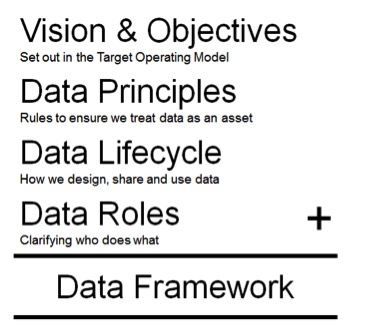To make sure Defra group can act together, the way each part – from smaller teams to whole agencies – designs, shares and uses data for operational and policy decisions needs to be aligned to common principles.
Defra’s Data Principles themselves form part of a common Defra Data Framework. The principles are the keystone in the framework that will build better bridges between operational aspects of Defra group to deliver better services.
Introducing our Data Principles
Back in January Sally Meecham, our Head of Digital Transformation, wrote a post about Why Principles Matter. Sally described how principles can ‘provide a quick and easy checklist by which to inform and measure decisions’, by reducing ambiguity and providing a common vocabulary that can we can use to hold ourselves to account.
Since Sally wrote her blog we have been doing a lot of work to develop principles in other key areas including applications, security, technology and data. These enterprise architecture principles will help our technical architects design products and services that better meet user needs, are more consistent and cheaper.
Our data policy challenge
Defra group has hundreds of data policies, processes and guidance documents. Different organisations have different approaches to the same tasks; this increases costs and reduces our agility. It also makes it difficult for our customers to engage with us, or for our technology specialists to deliver compelling products and services.
To address these challenges and ensure we work in one way, we are building a single data framework, including a single set of data principles, for the Defra group. This is illustrated below:

Writing our Data Principles
When writing our data principles, our number one driver was that everyone in Defra group uses some sort of data everyday – and therefore the principles needed to be applicable to everyone and all their data.
We wanted to write data principles that anyone could understand and use, so we worked hard on our language and kept things simple.
We wanted to build on existing work rather than re-inventing the wheel, so we drew together and reviewed all the data and information principles we could find, including those written by our colleagues across Defra group, Ministry of Justice, The National Archives, UKEOF (PDF) and Cabinet Office (ODT).
We wanted the principles to be accepted by all the organisations in the Defra group, so we consulted widely as we drafted them and got them approved by 4 separate boards – and most importantly by our Chief Architect (the IT one, not the buildings one).
We wanted to deliver fast, so we have produced a beta – we’ve worked hard to set the expectation that the principles are not perfect and that we will improve them as we learn from feedback from the people who use them.
Our beta Data Principles
For the first time, we now have a single set of Defra group Data Principles. The 9 principles apply to all data whatever its size, type, format or structure. The principles underpin our vision for data set out in our Target Operating Model and must be applied in the design of all new digital products and services.
| 1. Understand data needs | Research to develop a deep knowledge and understanding of: the business outcome you're trying to achieve; the things you’ll need to know; who’ll use the data; and their user needs. |
| 2. Identify an owner for your data | All data must have an owner from the most relevant business area. |
| 3. Standardise your data | Develop a data standard to help users understand: what the data is; how it is structured; its quality; its format; and how it can be used. |
| 4. Understand and maintain the quality of your data | It is important to understand the quality of data and to understand if investment is required to meet the needs of users. |
| 5. Share your data as widely as possible | Defra group’s data is open by design. You must share your data as widely as possible. |
| 6. Make your data easy to use, linkable and portable | Your data must be easy to use, from source, in common formats and if feasible as linked data. It must be easy to switch technology solutions without affecting the data. |
| 7. Make your data easy to find | It’s essential you make it easy for users to find your data and understand: its quality; how it was made; and how they can use it. |
| 8. Protect your data | Ensure your data is protected appropriately and complies with all relevant data policies and legislation. |
| 9. Build a community around your data | Build a community around your data that includes the data owner, data managers and users. Seek feedback from this community and act to improve the data in response. |
We will go into more detail on the rationale behind each principle and explore their business and ICT implications in a future blog post.
What next?
Our vision is that we’ll have ‘Better Data, that’s Better Used’. We believe that if we apply these principles to our data we will be able to realise this vision.
We are now working with colleagues across Defra group to raise awareness of these principles and are already seeing some early uptake:
- they have been included in the data packs for our UnITy procurements and potential suppliers will have to consider and address the principles in their tenders
- we are looking at how to embed the principles in our Digital Transformation projects
- we are working with our test managers to consider how the principles can be tested as part of our ICT test and development processes
We will continue to iterate and improve the principles as we see how they are used and your feedback would be welcome.
